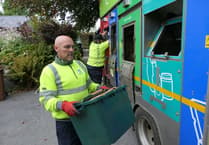Government plans to introduce digital identity cards have been dismissed as a ‘vanity project’ that will leave people in rural communities out in the cold.
Newton Abbot’s Liberal Democrat MP Martin Wrigley is demanding answers from the government over the ID card scheme which was unveiled this week.
He said: “There are many unanswered questions and it clearly won’t do what the government is suggesting it will.
“Illegal employers won’t ask to see a digital ID in the same way that they ignore current methods for checking a candidate’s right to work in the UK. This scheme will not only cost a huge amount of taxpayer’s money, which is already stretched, but it also risks disenfranchising a large number of people.”
He said many areas of the South West, including the Newton Abbot constituency, were struggling with ‘digital inclusion’ due to issues such as a lack of fast broadband.
He went on: “The elderly, disabled, and those on low incomes are most likely to be adversely affected by this policy.”
He said he would be asking what progress had been made on the government’s Digital Inclusion Action Plan published in February, with local people saying nothing has changed and they are still struggling with poor broadband.
And, he said, if digital ID cards are required by people wanting to rent homes, it will place additional burdens on the most vulnerable people in society, and risks deepening inequality in rural areas.
He said he was concerned about partnerships between the government digital giants such as Apple and Google, citing unease over data privacy.
And, he added: “I find it deeply upsetting that during a time where people are struggling to heat their homes, put food on their tables and access the healthcare they need, the governmentis preparing to spend billions on what can only be described as a ‘vanity project’ intended to appease voters who are increasingly looking to other parties.
“The government should be focusing on making life better for people across the country, not creating more divisions.”
Fellow Lib Dem MP Caroline Voaden (South Devon) has also come out against the ID card project. She said: “Liberal Democrats cannot support a mandatory digital ID where people are forced to turn over their private data just to go about their daily lives.
“People shouldn’t be turned into criminals just because they can’t have a digital ID, or choose not to. This will be especially worrying to millions of older people, people living in poverty, and disabled people, who are more likely to be digitally excluded.”
According to the Government website, the new digital ID “will make it easier for people across the UK to use vital government services.”
The site goes on to say the system will “improve access to services like welfare, childcare, and renting”, while strengthening right-to-work checks to deter illegal immigration.
Credentials will be securely stored on personal devices, similar to contactless cards or the NHS App, ensuring convenience, but maintaining security at the core of the project.


-with-her-Junior-International-Championships-2024-gig-rowing-medal.jpeg?width=209&height=140&crop=209:145,smart&quality=75)


Comments
This article has no comments yet. Be the first to leave a comment.